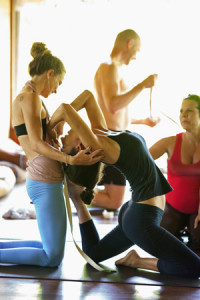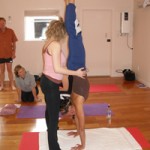by Kelly Fisher, Urban Yoga
Kelly works as a mentor for students wanting to move toward teacher training, currently training as teachers, or fresh out of training. In these articles, she shares some of the questions she’s asked. You can ask her your questions by sending her an email.
Question:
I am in teacher training and I feel as if my teachers aren’t giving the structure or guidance I was expecting to find my “voice”. They kind of just throw us in it and then critique us afterwards.
What are your words of wisdom on overcoming the fear to teach and feeling more confident? Does it just come with time?
Here’s some of my reply:
I have participated in many teacher trainings over the years and have found there are two main types:
1) Trainees are given lots of rules and formula about how to teach throughout the course but don’t actually teach until the final day.
2) Trainees teach right from the start and are given specific feedback as they go to help hone their voice.
I’ve observed the first kind of training results in a consistent product – factory produced teachers who eventually find their authentic voice once they start teaching in the real world. It was where I started and while it provided tangible benefit, it meant that when I got into teaching for real, there was a whole lot of struggle I hadn’t anticipated.
The second kind of training, like the one that you’re in, tends to produce teachers who have distinctive voices and a clear presence in the classroom when they start to teach in the real world. Teachers with this type of training are far more dynamic from the start and much more likely to develop a following faster.
I think the kind of teacher training where you get thrown in from the beginning is one of the best ways to find your voice.
True, that kind of training is significantly more challenging for participants but infinitely more useful for preparing you for the actual job of teaching. The catch is that it’s the quality of feedback (critique) you receive that will determine how quickly you evolve and how much of your own voice you can find in the relatively safe container of teacher training.
Feedback needs to be tailored to each individual so that the person can take the next logical step on their teaching path. Because everyone has different strengths and challenges, customised one-to-one feedback really is the best way to support a new teacher to find their voice and to take their own unique journey to the seat of the teacher.
If you’re not happy with the quality of the feedback you’re receiving, discuss it with the senior teacher. Giving feedback that will support rapid evolution in a teaching context is a specific skill of its own and perhaps not all of the teachers you’re working with know quite how to do it.
All of us are learning all the time and I would think that the faculty of any teacher training that’s being run the way it sounds like yours is would be open to your request for something different if you need it.
When you are just thrown into teaching, you see what your conditioning is straight away. All of the verbal and mental tendencies that happen when you’re uncomfortable come up.
It’s best to find that out in the safe space of teacher training and learn to deal with it gracefully rather than trying to teach in the real world for the first time and coming up against it.
Even now a decade into teaching, I still encounter uncomfortable parts of myself while I’m teaching. Knowing how to handle it and still hold the space for my students is crucially important to teaching well and sustainably.Your teachers are doing you (and your future students) a huge favor by letting you be uncomfortable now.
I suspect that they are watching you closely, knowing where you are and giving you a little bit of space to struggle and figure some things out for yourself. But they’re there if you need them. Just ask.
I’ve assisted on a teacher training where we threw people into the deep end. Our participants found the process very challenging indeed.
We had medical doctors, lawyers, dentists and project managers among our trainees. Despite the fact that they’d obviously been through rigorous training in the past for their professions, they said that teacher training was even harder. I think that’s the case because it’s not just learning a skill but it’s learning about a different aspect of yourself and coming face-to-face with your own vulnerability. And there’s no way out of that except through it.
So, well done for feeling the fear and acknowledging it. This uncomfortable phase won’t last forever.
The confidence will only come from getting up there again and again and again, even though your knees are shaking and your voice is cracking.
Trust me, you want to do this in teacher training as much as possible rather than in front of paying students!
If you have any questions or comments about this article, please contact Kelly direct by sending her an email.
About Kelly
 Kelly Fisher, e-RYT 500, has made yoga her full-time career since 2005 having spent most of the previous decade in big business IT and part of the decade before that studying Neuropsychology.
Kelly Fisher, e-RYT 500, has made yoga her full-time career since 2005 having spent most of the previous decade in big business IT and part of the decade before that studying Neuropsychology.
She is the owner of Urban Yoga, the co-founder of Yoga Unlimited,Wellington’s first upmarket yoga and wellness retreat and the catalyst behind Wellington’s offering of the first couple of years of the Global Mala event.
Over the course of her yoga career, Kelly has studied with many teachers from various lineages including Iyengar, Astanga, Satyananda, Prana Flow and Anusara and has investigated related sciences Ayurveda, Acupuncture and Craniosacral therapy. She is grateful for the support and advice she has had on her journey. Contact Kelly here.

